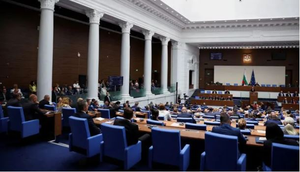Sofia: Bulgaria’s newly-elected National Assembly held its first session amid internal disputes and public protests.
It failed to elect a chairperson, despite a constitutional requirement to do so, at the first session on Monday since being elected at the end of October.
The 240 legislators from eight parties and coalitions were unable to secure a simple majority for any candidate. Five parties nominated their candidates for the position, but none gained enough support, Xinhua news agency reported.
The two leading candidates, Raya Nazaryan from the GERB-UDF coalition and Andrey Tsekov from the We Continue the Change-Democratic Bulgaria (PP-DB) coalition, qualified for the runoff, initially backed by 68 and 67 members of parliament (MPs), respectively.
In the runoff, Nazaryan received 68 votes from her coalition’s 69 MPs, while Tsekov gained 68 votes, including 37 from his coalition, 19 from MPs in the Alliance for Rights and Freedoms (ARF) coalition, and 12 MPs from the Morality Unity Honour (MECh) party.
The parliament will reconvene again on Wednesday in a renewed attempt to elect a chairperson.
Ahead of the plenary session, GERB leader Boyko Borissov told reporters that the next government could be a coalition of GERB-UDF, PP-DB, the 20-seat Bulgarian Socialist Party, and the 18-seat There Is Such People (ITN) party. He also proposed himself as the coalition’s Prime Minister.
ITN’s leader Toshko Yordanov, however, dismissed the idea, remarking that his party has not been consulted. “As far as I understand from my colleagues, the first political force has not spoken to any of them either,” Yordanov said, calling Borissov’s proposed role “absurd.”
Meanwhile, protests erupted in the city centre. Some protests organised by parties excluded from parliament were labelling the Bulgarian National Assembly “illegitimate.” Other groups were demanding changes, including a new electoral code and improvement of road safety.
The October 27 parliamentary elections now face legal scrutiny after the Constitutional Court launched an investigation Friday into alleged irregularities in 52 polling stations. This probe followed a formal request by 67 MPs, who cited video footage purportedly showing ballots misallocated between parties, affecting national results.
On Monday, the court launched a second investigation after 58 MPs raised additional concerns, alleging “numerous and various violations” during the elections, some of which, they claimed, constituted crimes.
–IANS


Comments are closed.